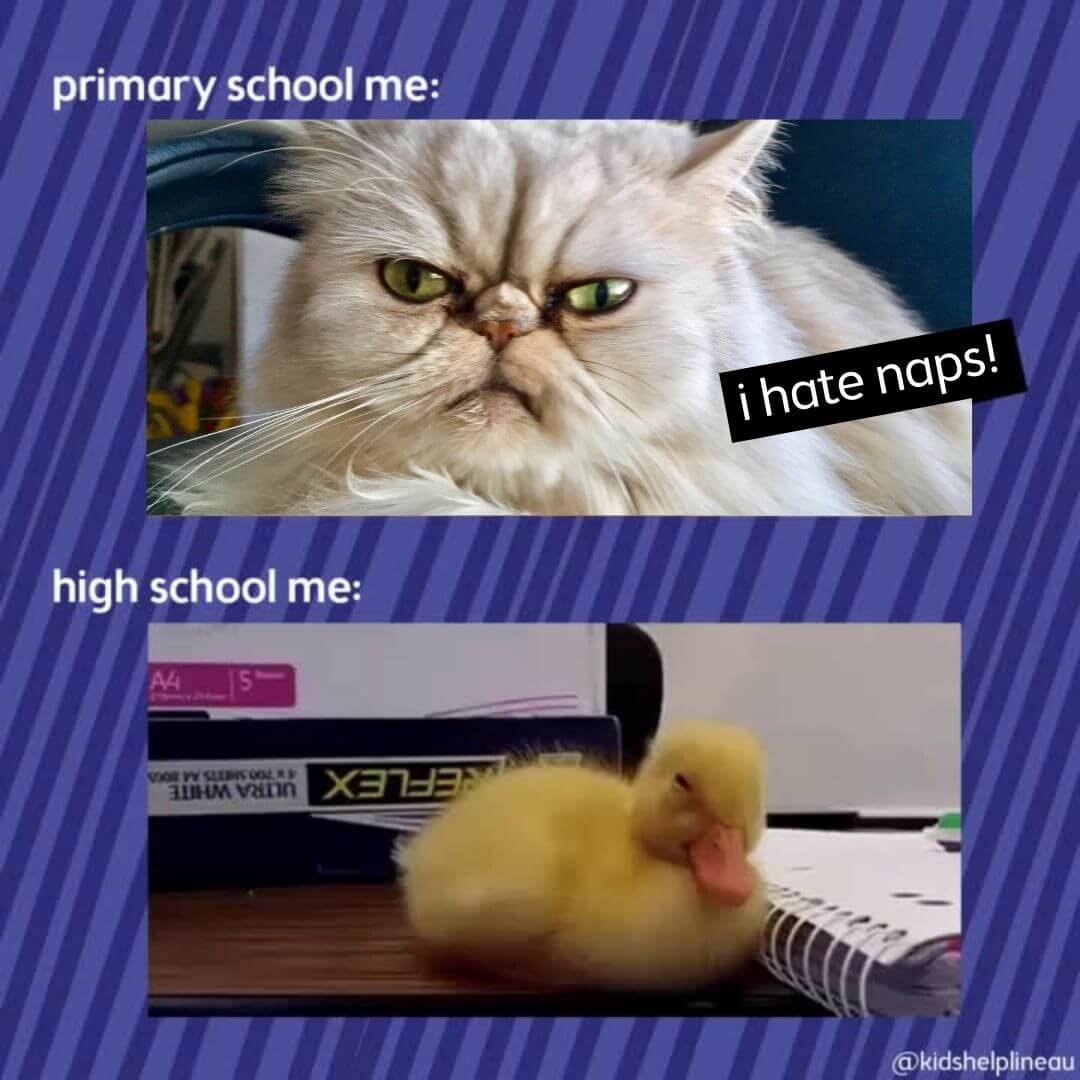Why do I freak out when I’m stressed?
To work out why you're feeling anxious, it can be really helpful ...
READ MEPuberty is a time of big changes - in your body, mind and life in general. Here's our survival guide to becoming a teen!
We've gathered together helpful info to get you through the good and not-so-good bits
This page will cover:
Body and brain changes, including info about puberty and mental health
Relationships, including stuff on getting on with family and friends, or dealing with dating
Life changes, such as starting high school
Hear from other teens, and find out their thoughts on being a teen

Body changes that occur in puberty
Growth spurts. Different parts of your body might grow bigger at different times.
Body shape changes. This can include the development of 'secondary sexual characteristics', e.g. hips or shoulders getting wider, growing breasts. (Some people struggle with body image as a result.)
Sleep changes. You might find you fall asleep late and love to sleep in.
Body hair. You will start to grow hair on different parts of your body, e.g. pubic hair, armpit hair, facial hair.
Hormonal changes. You may start menstruating, or produce hormones like testosterone that make external genitals grow.
Appetite and energy changes. You might start feeling hungrier and find your energy levels go up and down.
Becoming a teenager brings with it a lot of emotional changes. It's really normal to experience emotions like grief over leaving childhood behind or anxiety over new expectations, responsibilities and becoming an adult. Also, approximately 50% of all mental health issues appear by age 15, which means things like anxiety and depression are really common in teens.
Puberty doesn’t just trigger physical changes; it triggers mental and emotional changes as well. The teen brain is hard at work developing, and helping you go from being a kid to an adult. In fact, your brain doesn't fully finish developing until you are 25! Here are some ways things are changing for you:
Romantic and intimate relationships – There’s a lot happening here! Hormones are being released, and your body takes a long time to get used to these. You also might start dating, which can be a huge learning experience.
Identity – This is about who you are and how you fit into the world. You might compare yourself to others, start to question your gender identity or sexuality, explore your spirituality, or try new and different things to help figure out who you are.
Meaningful relationships – When you’re a child, your parents and siblings are the most important people in your life. As a teen, you start forming your own ‘community’, with different friendship groups and partners. This also means you are pushing boundaries, discovering your limits and developing your sense of independence.
Problem-solving and decision-making skills –In your early teens, you make most of your decisions with your amygdala (a part of your brain that plays an important role in emotions), which is part of the reason why teens take more risks. But, as you get older, your prefrontal cortex is developing and you slowly start making less emotional decisions and more intellectual decisions.
Navigating friends and family
Some of the changes you might be experiencing in your brain as a teenager include:
Interesting fact: Adolescence is the time the brain is best at socialising! Teens have more empathy and pick up on more social queues than children or adults do (in general).
Ok, so you have your first crush. Butterflies in your stomach? Check! Think about them all the time? Check! Want them to like you? Check! But did you know not all crushes are the same? Check out this Mikki vs the World video to figure out what type of crush you have!
Starting high school
Leaving primary school behind and starting high school can be a time that's both exciting and stressful.
Here's some stuff that can help:
If you need help setting up a good study routine, these handy study tips can help!
"I know I said before that I'm excited to make new friends [in high school]... but it's scary making new friends."
-Tee, Year 6 student
Why do I freak out when I’m stressed?
To work out why you're feeling anxious, it can be really helpful ...
READ MEPeer pressure and fitting in
When your mates pressure you to do or go along with something ...
READ MEWays to deal with conflict
Conflict can happen in any situation. Learning how to deal with it ...
READ MEFeeling sad and depression
Feeling sad is not the same as being depressed. Sometimes it’s ...
READ METalking helps! We’re here for you.
No problem is too big or too small.
We're here 24 hours a day, 7 days a week